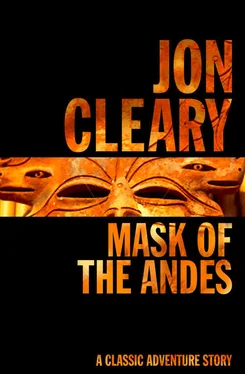Jon Cleary - Mask of the Andes
Здесь есть возможность читать онлайн «Jon Cleary - Mask of the Andes» — ознакомительный отрывок электронной книги совершенно бесплатно, а после прочтения отрывка купить полную версию. В некоторых случаях можно слушать аудио, скачать через торрент в формате fb2 и присутствует краткое содержание. Жанр: unrecognised, на английском языке. Описание произведения, (предисловие) а так же отзывы посетителей доступны на портале библиотеки ЛибКат.
- Название:Mask of the Andes
- Автор:
- Жанр:
- Год:неизвестен
- ISBN:нет данных
- Рейтинг книги:5 / 5. Голосов: 1
-
Избранное:Добавить в избранное
- Отзывы:
-
Ваша оценка:
- 100
- 1
- 2
- 3
- 4
- 5
Mask of the Andes: краткое содержание, описание и аннотация
Предлагаем к чтению аннотацию, описание, краткое содержание или предисловие (зависит от того, что написал сам автор книги «Mask of the Andes»). Если вы не нашли необходимую информацию о книге — напишите в комментариях, мы постараемся отыскать её.
Mask of the Andes — читать онлайн ознакомительный отрывок
Ниже представлен текст книги, разбитый по страницам. Система сохранения места последней прочитанной страницы, позволяет с удобством читать онлайн бесплатно книгу «Mask of the Andes», без необходимости каждый раз заново искать на чём Вы остановились. Поставьте закладку, и сможете в любой момент перейти на страницу, на которой закончили чтение.
Интервал:
Закладка:
However, he confided none of this to McKenna immediately. Once he had left university his life had been so peripatetic that friendships had come to have the impermanent qualities of those photographs one took in those do-it-yourself kiosks on seaside promenades: instant development and already fading before you were out of sight of the kiosk. Over the last five years he had come to appreciate the poor value of such friendships and he had become increasingly stingy in paying out himself to chance acquaintances. But he still valued companionship, even if he now looked for it with a cautious eye. The man with no friends is the one who appreciates most that no man is an island; he is the one who never asks for whom the bell tolls, for he knows. Taber was doing his best to turn a deaf ear to bells of any sort.
When McKenna said he had to get ready to go down to San Sebastian, Taber said, ‘May I ride back with you?’
McKenna looked surprised. ‘How did you get up here?’
‘I have a Land-Rover, brought it down from La Paz with me. My driver went back down to Altea to buy some fish. I was going to walk down there and pick him up. But—’
‘I’ll be glad of your company,’ said McKenna eagerly, and disappeared into the bedroom. ‘And I’ll give you some fish. I’ve got far too much.’
Taber walked out into the yard. The wind was still blowing, bringing with it the chill of the distant snow. The mission had a beautiful view of the lake and the jagged wall of mountains rising beyond it, but it was completely exposed to the wind up here at the top of the slope. In one corner of the stone-walled compound some chickens huddled mournfully together in a small tin-roofed coop; in another corner a thin sad cow looked as if she might yield only iced yoghurt. A small vegetable garden had been attempted on the sheltered side of the kitchen hut, but it looked more like a gesture than a productive enterprise. The huts themselves, of adobe walls and corrugatediron roofs, suggested an isolated slum, a tiny section that had somehow drifted apart from the rest of the world’s poverty. What a miserable bloody existence he must lead, Taber thought; and wondered why Christ had always made a virtue of poverty. Still maybe this went over better with the Indians than would the affluence of the Vatican he had seen when last in Rome. The world even now wasn’t ready for missionaries in Mercedes-Benz.
McKenna came out in a well-cut black suit and wearing a clerical collar; he was hardly recognizable as the man who ten minutes before had been in a torn turtleneck sweater and faded jeans. ‘I may run into the Bishop – he has some idea that God is fashion-conscious. Here’s your fish.’
Taber took the three salmon strung on a piece of wire. ‘Are you having tea or sacramental wine or whatever it is you have at the cathedral?’
‘I’m on my way to see some people named Ruiz. You know them?’
‘I know of them. I’m supposed to call on Alejandro Ruiz. I gather he’s the big-wig around here.’
‘That describes him. He’s the one I’m going to see. I got a message last night he wanted to see me. Not even us foreigners ignore an invitation from a Ruiz.’ He shot a careful glance at Taber. ‘You might remember that.’
He led the way round to the back of the larger hut. There, under a lean-to, stood a late-model Jeep fitted out elaborately for camping; as Taber climbed into the front seat he glanced back and saw the bunk, the folding table and the built-in cupboards. The contrast to what surrounded it was too much for Taber and he could not hide his surprise.
‘A present from my mother,’ said McKenna, who was watching him closely. He reached back and unhooked something from the roof; a large crucifix swung down. ‘For when I’m supposed to be saying Mass from the back of the Jeep. She thinks I’m doing a Billy Graham down here in Bolivia – I’m waiting for her to send down one of Ringling Brothers’s old tents.’
‘Not an old one, surely. Wouldn’t she buy a new one?’ Then he pulled off his cap and scratched his head, a habit he had when embarrassed. ‘Sorry. I shouldn’t talk about your mother like that. She obviously means well.’
‘Too well,’ said McKenna, but his voice was flat of any emphasis. He started up the Jeep and they drove out of the yard and down the road. ‘Why don’t you come to the Ruiz’s with me now? I can introduce you.’
Taber hesitated, then shook his head. ‘You know how formal these criollos are You don’t just drop in on them.’
‘I’ll explain the circumstances, that you helped me save Jesu Mamani from the lake. It will give them something to talk about. All they have to live on is gossip.’ He looked directly at Taber and again there was the eagerness: ‘Come with me! I can face them better with someone to back me up.’
‘What are they – holdovers from the Inquisition or something?’
McKenna grinned, embarrassed in his turn. ‘They’re medieval – or damned near it. The original Ruiz came over here from Spain about ten years after Pizarro – and these Ruiz think that time was the high spot of world history. They live in the past, every one of them thinking he’s the ghost of some conquistador. At one time they owned all the silver mines around, but that was over a hundred, maybe a hundred and fifty years ago. They lost them some time after Bolivar liberated the country. After that they owned only land, but they had enough of that, something like five thousand square miles of it. They lost most of that in the 1952 revolution – they still own some up beyond the lake that the government, somehow, never got around to parcelling up amongst the campesinos – but they’re still the wealthiest family in this part of the country and they’ve got fortunes salted away in Switzerland. Whoever happens to be in power up in La Paz still listens to them. I think maybe what makes me uncomfortable when I’m with them is that they should be finished, that they’re an anachronism today, yet they still have power.’
‘I thought you’d be used to that.’
‘What d’you mean?’
‘You’ve just described your Church.’
‘Put your needle away,’ said McKenna. ‘I’ll bet there are some FAO guys who should be defrocked for saying the same thing about your organization. You might make a good heretic yourself.’
‘It’s funny, both of us having our headquarters in Rome. I wonder if the Pope and my boss ever ring each other for advice?’
McKenna laughed. ‘It’s a thought. But watch your heresy where we’re going. One of the Ruiz, Alejandro’s second brother, is my immediate boss. He’s the Bishop of San Sebastian.’
They came into Altea. At a distance it looked like a landslide of huge boulders in the shallow ravine in which it lay; the thatched roofs could have been dead scrub that had been carried down in the same slide, except that none of the surrounding slopes grew any scrub. Only the whitewashed tower of the adobe church, rising above the jumble of huts like a pinnacle of dirty ice, was a landmark; the rest of the village was part of the landscape, washed by the rain and scoured by the wind into the dun-coloured slopes of the ravine. In a vague way it reminded Taber of the hovels in the villages on the Anatolian plateau of Turkey; in his imagination poverty itself had become dun-coloured. In the landscape of his memory Altea would eventually run into a hundred other places.
McKenna brought the Jeep to a halt beside a Land-Rover. Taber got out, found his driver, gave him the three salmon, then came back and climbed into the Jeep again. As he did so, a short, fat priest in a shabby black soutane went by. McKenna spoke to him, but the priest ignored him and hurried on to disappear into the shabby hovel of a church. They match each other, Taber thought, the priest and the church.
Читать дальшеИнтервал:
Закладка:
Похожие книги на «Mask of the Andes»
Представляем Вашему вниманию похожие книги на «Mask of the Andes» списком для выбора. Мы отобрали схожую по названию и смыслу литературу в надежде предоставить читателям больше вариантов отыскать новые, интересные, ещё непрочитанные произведения.
Обсуждение, отзывы о книге «Mask of the Andes» и просто собственные мнения читателей. Оставьте ваши комментарии, напишите, что Вы думаете о произведении, его смысле или главных героях. Укажите что конкретно понравилось, а что нет, и почему Вы так считаете.












